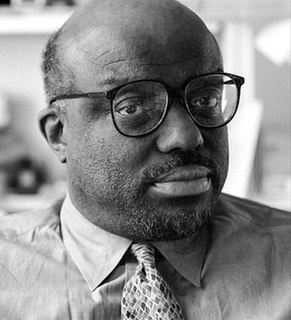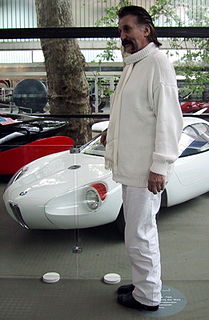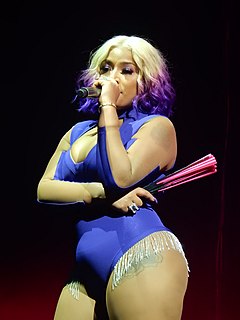A Quote by Woody Allen
I could turn on my radio in the morning when I was getting dressed for school and hear Frank Sinatra and Duke Ellington and Benny Goodman and think this is the music. Now that music is art. Ellington is art. At that time it was just what you heard on the radio. Cole Porter was just a guy who wrote pretty songs and Billie Holliday would sing them.
Related Quotes
I want people to feel what it was like in the '40s. That's when popular music in the United States was so beautiful. Frank Sinatra, the Pied Pipers, Duke Ellington, Fletcher Henderson, Tommy Dorsey, Billie Holiday. That's when popular music had deeper values, to me. This was music that was selling millions of records.
In the mid-'60s, AM radio, pop radio, was just this incredible thing that played all kinds of music... You could hear Frank Sinatra right into the Yardbirds. The Beatles into Dean Martin. It was this amazing thing, and I miss it, in a way, because music has become so compartmentalized now, but in those days, it was all right in one spot.
I wrote 'Turn Your Radio On' in 1937, and it was published in 1938. At this time radio was relatively new to the rural people, especially gospel music programs. I had become alert to the necessity of creating song titles, themes, and plots, and frequently people would call me and say, 'Turn your radio on, Albert, they're singing one of your songs on such-and-such a station.' It finally dawned on me to use their quote, 'Turn your radio on,' as a theme for a religious originated song, and this was the beginning of 'Turn Your Radio On' as we know it.
Above all else, [Benny Goodman] was a great player, one of the greatest American music has produced. He brought his absolute talent and his invincible love of music to the fore every time he played. There are many other things connected to society and ethnicity that are often mentioned in a discussion of Benny Goodman but all of them are connected to his overwhelming affection for the art of the music and the fairness it should be allowed to express.
There is a man up in Philadelphia, I've known him for 50 years now, his name is Sid Mark. He does a radio program featuring Frank Sinatra music exclusively - one show for decades, "Friday with Frank," "Saturday with Sinatra," "Sunday with Sinatra," for decades. This is something that is really quite important.
Duke Ellington's career traces the entire history of jazz. The repertoire associated with him contains the most important elements in the music and provides concrete examples of some of the best ways to present the music in the widest variety of settings-radio, TV, recordings, movies, concert halls, festivals, solo, small ensemble, big band, symphony orchestra, opera, Broadway shows.... You name it, he did it!
Everybody in Germany was for the -German cause. But then, after the war ended, when I heard the first Glenn Miller sound on the radio and these fantastic American music makers, I turned into a jazz fanatic. They called me Benny, after Benny Goodman. So, all of a sudden, the eyes of young Germans were opened to America - everything American was absolutely at the top of the list.







































